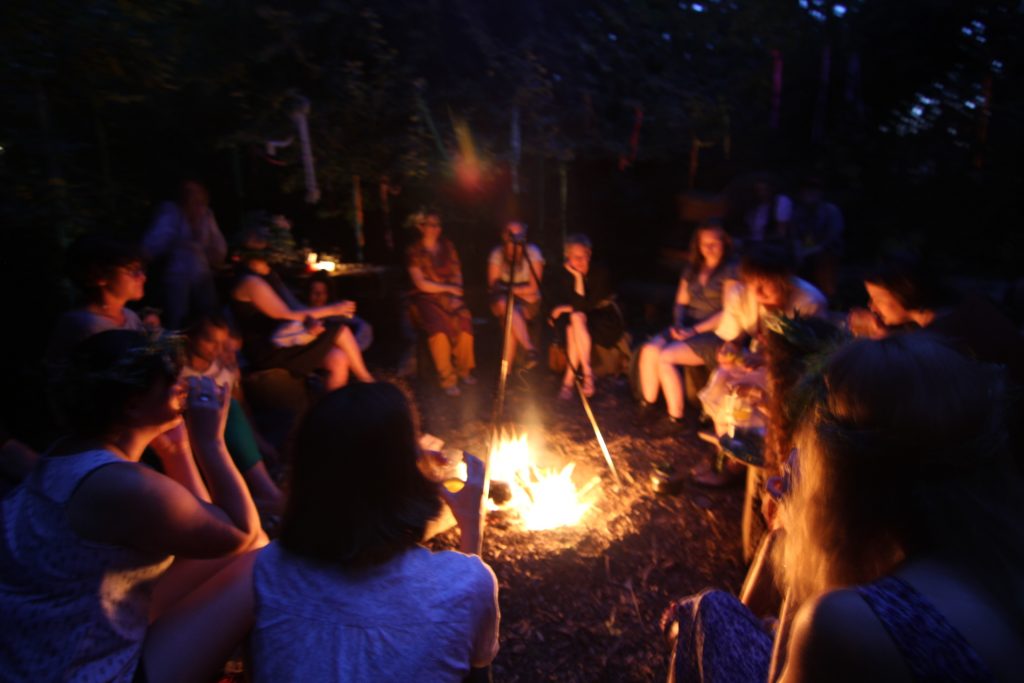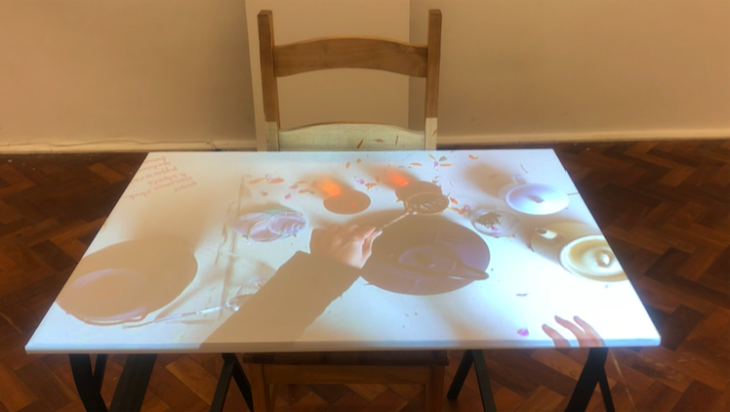UCL TRELLIS: SOCIAL MAKING: NATURE, RITUAL AND COMMUNITY
Social making: nature, ritual and community is a culmination of participatory events linked to the four seasons with local volunteers from Cordwainers Grow and Ukrainians who have recently arrived in east London. At these seasonal gatherings we used plant and animal materials – some of them, like flax, grown by Cordwainers in the garden – to make Ukrainian folk ritual objects including motanka (guardian dolls), didukhs (wheat sheafs representing ancestor spirits), hromovytsia candles to protect against storms and painted eggs to celebrate new life.
Embracing the collaborative mode of working, exchanges were developed over the project with the local performers and makers Olivia Armstrong, Maria Magdalena, Ganna and Vitalii Pryimak, Victoria Isai, and Sofiya Marynyak. The side-by-side making and story exchanges about medieval magic and environments prompted by Sophie built connections between the communities, layering historical, ecological and cultural knowledge from medieval times to today.
Over this period, and for the exhibition Olha produced oil paintings that were informed by staging and witnessing the community making. The four paintings represent ritual objects made during the seasonal events. The are intended to bring the heightened and embodied experience of working with natural materials into the exhibition space.

As part of their exhibition BREAD, in 24 February 2024 OSCH Projects hosted a workshop, led by artist Olha Pryymak, in which the participants made sacred ritual guardian objects from slavic culture – corn dollies, which represent the perishable material culture of the agrarian people living in the current territory that is Ukraine. The sacred objects were fashioned out of various plants that are usually grown to make bread.


Last Kupala Festival of participatory art took place at Phytology, Bethnal Green Nature Reserve in June 2022. Kupala is a traditional pre-christian Slavic holiday, originally celebrated on the shortest night of the year. Olha Pryymak has established and co-curated the Kupala festival at Phytology between 2017-2022. The festival seamlessly brought together arts, sciences and humanities and engaged diverse audiences from local Bethnal Green residents, artists and Ukrainian diaspora.
Between 2017-2022 Kupala festival brought together performative and participatory works by a range of international artists, all examining the relationship between nature, science and art. The inaugural 2017 edition was co-curated with Frances Brown. Invited guests for the 2017-2018 edition were scenic artist Rosa Pomery, musicians Svitlana Pyrkalo, Victoria Golden berg, Martina Schwarz, astronomer Paul Hill. and ethnomusicologist Merlyn Driver. The 2019 Lunar Edition of the festival featured a collection of artists responding to the 50th anniversary of landing on the Moon, drawing inspiration from Kupala folk rituals.
In 2022, the festival featured collaborations with a growing population of displaced Ukrainians who have recently made the UK their home. Every year since 2017 Kupala has featured a traditional midsummer night’s floral crown making, Ukrainian food, bandura playing, alongside performances and installations by artists challenging the notions of coloniality, gender and migration.

In 2020 Olha’s ongoing participatory practice has been platformed by the Virtual Care Lab and Navel, based in LA, drawing audience across the globe – the silver lining of the Coronaverse. There she held monthly virtual tea sessions – workshops in exploring virtual togetherness over a cup of herbal tea. Olha’s performances drew on her family’s herbal medicine background and made space for imagining new futures with plants. The painting side of her practice draws on these encounters as compassion and time paid to these concerns.
The intimate tea sessions were structured like a herbal healer seance with key actions and spells, suggesting by example the type of associative narratives possible to weave around a particular plant. During the session the participants were prompted to prepare that particular herbal tea, their actions tapping into their kinetic and olfactory memories. This ritual opened up a stage for bringing out all the the hedonistic and pleasurable personal histories that are associated with plant-based drinks. The participants were invited to contribute their memories and associations, to feel out virtually the possible connectedness with the others and, most importantly, with the plants. The performances’ ambitious goal was to offer a blueprint ritual for reinventing and resampling participants’ own narratives.
For the Festival of Intimacy in 2021 UCL has commissioned Olha to run tea sessions along the audio-sensory walk on site of the university developed in collaboration with walking artist Stephanie Whitelaw. Marking the students’ return to school after lengthy pandemic lockdowns, Steps & Steps performance invited the participants to refamiliarise themselves as they traveled across campus with the audio guide, reactivating their senses beyond the visual.
At the end of the walk participants reflected on their re-familiarising experience over a cup of herbal tea in Gordon Square. This in-person commission was a culmination of a year long pandemic-time collaboration with Stephanie of virtual walks and teas, platformed by the Virtual Care Lab, the LA-based series of creative, community-led experiments in remote connection.
HERBAL TEA LABO

The focused attempt at conceptualizing the link between her performance and painting practices drove Olha to a residency in 2019 at AIRY Yamanashi. Experimenting at the residency with regular weekly intimate sessions over a pot of tea opened up conversations about cultural building, perceptions of the natural, speaking to the human culture-nature divide. In response to those sessions Olha started making small still lifes out of clay and plants used in the tea. Those still lives became the fragile extensions of the performances, drawing on the history of participatory art, featuring Lygia Clark, Yoko Ono and Marina Abramović. Painting allowed for deep haptic thinking with the hands, extending the affective encounter into the material object. The figuration in painting from observation lended its historical gravitas to serve as a form of monumental and most archival form of culture making.
Exhibition detail, Herbal Tea Labo, Kofu, as part of the residency at AIRY, Yamanashi, 20